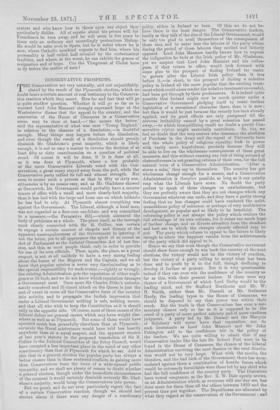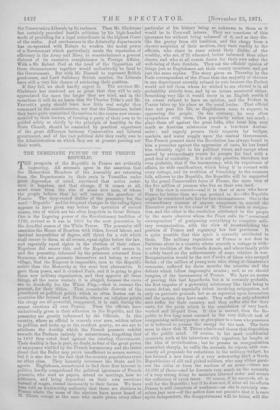CONSERVATIVE PROSPECTS.
THE Conservatives are very naturally, and not unjustifiably, elated by the result of the Plymouth election, which no doubt bears a certain amount of real testimony to the Conserva- tive reaction which they assert. How far and fast that will go is quite another question. Whether it will go so far as to warrant Lord John Manners' strongly expressed hope at the Westminster dinner that the appeal to the country, and the renovation of the House of Commons in a Conservative sense, may be close at hand,—' the sooner the better,' said the representative of what was once Young England,' in relation to the chances of a dissolution,—is doubtful enough. Many things may happen before the dissolution, and even though the result of a dissolution should greatly diminish Mr. Gladstone's groat majority, which is likely enough, it is not so easy a matter to reverse the decision of at least fifty or sixty constituencies on a question of political creed. Of course it will be done, if it is done at all, as it was done at Plymouth, where a few probably of the more Conservative Liberals voted with the Con- servatives, a great many stayed away from the poll, while the Conservative party rallied its full and utmost strength. But even to secure such a process as that in fifty or sixty con- stituencies is by no means easy, and, as Mr. Gladstone showed at Greenwich, his Government would probably have a securer tenure of office with a small and more closely-knit majority, than it has had with the large and loose one on which hitherto he has had to rely. At Plymouth almost everything was against the Government. The Liberal, although a local man, was not regarded as a first-rate candidate, and was committed to a measure,—the Permissive Bill,—which alienated the body of publicans as a whole. The place itself, as the borough most closely connected with Sir H. Collier, was certain to expre,ss a certain amount of chagrin and dismay at the apparent unscrupulousness of the Government in ignoring, if not the letter, yet to all appearance the spirit of so recent an Act of Parliament as the Judicial Committee Act of last Ses- sion, and this, as most people think, only in order to provide for one of its own officials. Then, again, the place, as a great seaport, is not at all unlikely to have a very strong feeling about the losses of the Mega3ra and the Captain, and we all know that popular opinion is never very discriminating as to the special responsibility for such events ;—rightly or wrongly, the existing Administration gets the reputation of either negli- gence or ill-luck, and we do not know which reputation damages a Government most. Once more Sir Charles Dilke's unfortu- nately conceived and ill-timed attack on the Queen is just the sort of event to rouse all the Conservative force of the country into activity, and to propagate the foolish impression that under a Liberal Government nothing is safe, nothing secure, and that all who wish to keep the Constitution as it is should rally to the opposite side. Of course, most of these causes of the Liberal defeat are general causes, which may have weight else- where as well as at Plymouth. But some of them would have operated much less powerfully elsewhere than at Plymouth ; certainly the Naval misfortunes would have told less heavily anywhere than at a naval seaport, and the apparent evasion of last year's statute in the proposed translation of Sir R. Collier to the Judicial Committee of the Privy Council, would have occupied a less important place in the mind of any other constituency than that of Plymouth for which he sat. Add. to this that in a general election the popular party has always a better chance than in these scattered conflicts, as gaining more than Conservatives from the force of a wide-spread public sympathy, and we shall see plenty of reason to doubt whether a general election, though under the immediate circumstances of the moment it would certainly diminish seriously Mr. Glad- stone's majority, would bring the Conservatives itto power.
But we grant, and do not even particularly regret, the fact of a certain Conservative reaction, though we should feel sincere alarm if there were any danger of a reactionary
policy, either in Ireland or here. Of this we do not be- lieve there is the least danger. The Conservative leaders, loudly as they talk of the sins of the Liberal Government, would' be only too glad to avail themselves of the consequence of those sins, and to enter into the labours of the party whom during the period of those labours they reviled and bitterly opposed. Lord John Manners hardly knows how to express the indignation he feels at the Irish policy of Mr. Gladstone, yet we suspect that Lord John Manners and his collea- gues, if they return to office, would look forward with some glee to the prospect of finding Ireland far easier to govern after the Liberal Irish policy than it was before it,—in short, to the prospect of finding a sedative policy in Ireland all the more popular that the exciting treat- ment which could alone render the sedative treatment successful, had been got through by their predecessors. It is indeed quite possible that Ireland might now be much quieter under a Conservative Government pledging itself to resist further legislation of a sensational character there, than it is now ; but then it would be just because the remedy has been already applied, and its good effects are only postponed till the nervous irritability caused by a great sensation has passed away,—to which tranquillizing result no doubt a purely Con- servative rtIginte might materially contribute. So, too, we feel no doubt that the very orators who denounce the abolition of Purchase in the Army and the repeal of University tests and the whole policy of religious equality, look to power with vastly more hopefulness, precisely because they will be able to live on the wholesome consequences of these great measures, and this without running any risk of being accused of obstructiveness in not granting reforms of their own, for the full
natural term of a Conservative Administration. After a storm a calm,' they say to themselves. The country has got wholesome change enough for a season, and a Conservative Administration is therefore possible, so long as it can quietly reap what the Liberals have sown. No doubt the party prefers to speak of these changes as unwholesome, but they are perfectly aware that they are not changes which any Government whatever can undo, and they have a pretty strong feeling that no less changes could have rendered the quiet, unambitious policy of reticence, or perhaps of very unobtrusive development, so popular and so likely to be beneficial. The reforming policy is not always the policy which realizes the full advantage of its own reforms, for it raises too much hope of further change, and so diverts attention from the steadiest and best use to which the changes already effected may be put. The party which refuses to appeal to the future is likely enough to educe the happiest results from the achievements of the party which did appeal to it.
Hence we say that even though the Conservative movement should show force enough to win back the country at the next elections, the victory would not be the victory of reaction, but the victory of a party willing to accept what has been done and to profit by it to the full, though declining to develop it further at present. But it is very questionable indeed if they can even win the confidence of the country so far as this, with their present leaders. If there were any chance of a Government of which Lord Derby would be the leading mind, and Sir Stafford Northcote and Mr. W. H. Smith, rather than Mr. Disraeli or Mr. Gathorner Hardy, the leading types in the House of Commons, we should be disposed to say that power was within their reach. But the truth is that Conservatism has even a mo- mentary chance only so far as it is supposed to be the creed of a party of more perfect sobriety and of more cautious judgment. A party led by Mr. Disraeli and the Marquis of Salisbury will never have that reputation, nor do such lieutenants as Lord John Manners and Sir John Pakington add to the confidence felt in the policy of the leaders. We are quite willing to admit that if any Conservative leader like the late Sir Robert Peel were to be found in the House of Commons, the chance of the Liberal Administration surviving the next Session or the next dissolu- tion would not be very large. What with the merits, the blunders, and the bad luck of the Government, there has accu- mulated against them a combination of hostile forces which would be extremely formidable were these led by any chief who had the full confidence of the country party. The Dissenters have vowed vengeance, as the Rev. R. W. Dale openly avows, on an Administration which, as everyone will one day see, has done more for them than all the others between 1832 and the present time put together. The Republicans are alienated by what they regard as the conservatism 01 the Government ; and
the Conservative-Liberals by its rashness. Then Mr. Gladstone has certainly provoked. hostile criticism by his high-handed mode of providing for a legal subordinate in the highest Court of the realm. And carelessness in the Admiralty departments has co-operated with Nature to weaken the moral power of a Government which particularly needs the reputation of efficiency in the Army and Navy, to counterbalance a general distrust of its excessive complaisance in Foreign Affairs. With a Sir Robert Peel at the head of the Opposition all these circumstances together would undoubtedly be fatal to the Government. But with Mr. Disraeli to represent British good-sense, and Lord Salisbury British caution, the Liberals have still a very fair chance of retrieving their position.
If they fail, we shall hardly regret it. The services Mr. Gladstone has rendered are so great that they will be only appreciated the more the longer they are tried, and in the meantime it will do no harm that Sir Charles Dilke's and Mr. Fawcett's party should learn how little real weight they command in the constituencies, nor that the Dissenters, before they have quite committed themselves to the course now recom- mended by their leaders, of forming a party of their own to be guided solely or chiefly by the principle of hostility to the State Church, should. be reminded by practical experience of the great difference between Conservative and. Liberal government, and of the vast political debt they really owe to the Administration on which they are at present pouring out their wrath.



































 Previous page
Previous page